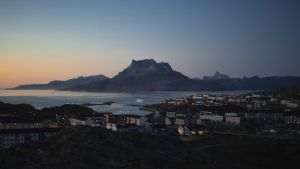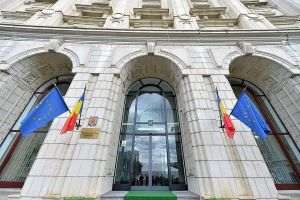Reporter: How would you describe the recent events occurring on Romania's political stage?
Teodor Baconschi: I will follow the logic of the European institutions (the Commission, the Parliament, the European Council, the Venice Commission) who have sentenced the abuse and the attacks against the state of law, which have occurred over the last few weeks. We are under a strict watch, beyond the cooperation and verification mechanisms, because we have brutally changed the rules of the democratic game, through the USL. We need to fix this harm that has been done, we need to restore the state of law, and this thing can only be done through the cooperation of the non-governmental organizations, the democratic political parties (PDL, the New Republic, PNŢCD), all the political factions which are concerned by the recent developments. Fortunately, as a member state, we have the possibility of notifying Brussels of all that is happening. Besides, the domestic situation is being monitored by all the embassies of the EU member states.
Reporter: Last week, together with PDL and Mihai-Răzvan Ungureanu, you staged a protest against the violation of the principles of democracy and the state of law. How would you explain the absence of spontaneous reactions of the civil society, in response to the actions of the Government and of the Parliament, unlike what happened last winter?
Teodor Baconschi: The USL has started a blitzkrieg against the rule of the law, has attacked the Constitutional Court, has abusively replaced the ombudsman, it has changed the law of the referendum through an emergency ordinance. All of these operations took place in summer, when everyone is apparently lethargic or is not paying attention, but the seriousness of what happened starting echoing across the social networks, on the internet; many NGOs have already reacted. I hope we don't end up in the situation where only massive street protests will actually do something. However, there is a need for a lot of solidarity, of all the free citizens, of all the players in the economy, who are concerned over the depreciation of the leu and the risk, of eventually being sanctioned by the European Union. If the living forces of the civil society will band together and act together, I am convinced that this attack on the institutions of the state of law will be stopped on time.
Reporter: Did the statements you made against the protesters at that time, come true?
Teodor Baconschi: All citizens that take to the street to protest are respectable. In a free country, you have the right to express your opinion and to protest against the problems you disagree with. I have seen such groups in the Victoriei Square, in the University Square, there was the meeting of the Revolution Square, with thousands of people, there were civic protests in the country or in Paris. I think that slowly, the population is becoming aware of the gravity of the situation we are in, and will voice its disagreement, through all the available channels.
Reporter: In this context, do you feel that the response of the opposition to the actions of the USL is appropriate?
Teodor Baconschi: The PDL is a party which, on one hand, paid the price of being in power during the crisis, the austerity measures, and on the other hand, has started to position itself as an opposition party. By the time PDL understood it should oppose the new government, several weeks passed, during which time many thought it was a decision of non-combat. Now every member must start thinking like an insurgent, criticize the abuse of the power, and also start talking to the citizens, who must understand that the agenda of the USL does not coincide with the national interest.
Reporter: How do you think that these political actions will affect the economic environment and later the living standard of the population?
Teodor Baconschi: The restorations of the wages are already being eaten away through the devaluation of the leu, millions of Romanians with loans in Euros are themselves affected by the political situation, by the crisis and by this supreme abuse of suspending the president who was legitimately elected two years ago. These political events are perceived not just by the European institutions and the governments of the member states, as a negative development. Domestic and foreign investors alike are wondering over the point of investing in an unstable country, which even while being a member of the EU and NATO allows itself to disregard the rule of the law so blatantly. Any investor makes a business plan, a feasibility study, will research the market and will invest money only in predictable states, both in terms of fiscal policies as well as in terms of the functioning of their institutions. Unfortunately, these months, Romania can not be perceived as a safe state and this will definitely dissuade investors. Today even (ed. note: Monday) we had a forecast which places the exchange rate of the leu at 4.7 against the euro. In other words, the 90s style extravaganzas of the USL will have major economic costs and will negatively affect the living standard of every Romanian.
Reporter: And what about Romania's image?
Teodor Baconschi: When the president of the European Commission, the president of the European Council, the German chancellor, the State Department in Washington, issue warnings, they raise the red flag, concerning what is happening in Romania, it is clear we have ruined our image over the long term. We did not ruin over minor subjects, like the crimes committed by Romanian citizens on the territory of other states; instead we ruined it by deserting the community of European values, like the German minister of foreign affairs was saying a few days ago. All of these negative perceptions could lead to Romania being isolated, being marginalized and sanctioned. The European treaties include the possibility of punishing a member state which violates the values of the community: democracy, the rule of the law, the fundamental freedoms, the institutions of the law-ruled state and also the democratic alternation in power.
Reporter: What is the function of diplomacy during this period, and how could it be influenced, in turn, by the decisions of the government?
Teodor Baconschi: I am convinced that minister Marga understands that we are no longer in the times of Ceauşescu, when diplomacy would put a mask on the face of dictatorship. What is happening now is a coup between the Parliament (with the clumsily stitched together majority) and the Ponta government, so that Mr. Marga can say any lie he wants. No one is going to believe him. Things were seen with the naked eye, first of all by the embassies of Bucharest, sent to their respective governments, construed and resulted in this list, which is unfortunately very lengthy, of extremely critical reactions. We will need to set our image straight, by proving the opposite, but this process will take a very long time. It is very hard to regain international credibility after you've crossed the lines which protect the rule of the law.
Reporter: Are there any chances of the reactions of the international community influencing the actions of the Romanian government?
Teodor Baconschi: Definitely! Even though we have not switched to the Euro, our economy is dependent on the European funds, and on the good relationship we have with the European institutions. I am convinced that the USL will very quickly understand that it has no room to maneuver and that it needs to restore the principles and values of the rule of law, if it still wants to be a partner in the European Union.
Reporter: What measures can the foreign leaders and international organizations take against Romania?
Teodor Baconschi: We can have access to European funding be suspended, we can have our votes in the European Council be removed, but beyond the practical measures included in the Lisbon Treaty, we are talking about a reality. I am referring to the fact that, if you are not credible as a partner, you get marginalized. I hope with all my heart, that Romania will not find itself in a situation like that, one it doesn't deserve, which is not to blame by the Romanian citizens, and for which, it obviously they shouldn't be them footing the bill, but this opportunistic alliance of parties, which is acting irresponsibly.
Reporter: In your opinion, what would be the fastest way to deal with the current political crisis?
Teodor Baconschi: The harm has been done. We need to fix the current crisis through a massive resistance, both of the parties in the opposition (especially PDL), as well as by supporting the new right-wing clean political forces, de such as the New Republic. I am convinced that the lucid citizens of Romania understand what is happening, they will not remain passive and will impose, including by voting, in November, a direction that will not lead us to the precipice.
Reporter: Can you tell us a few words about the decision to join the initiative of Mihai-Răzvan Ungureanu, the Center Right Civic Initiative?
Teodor Baconschi: For more than a year, I have claimed the need for all the center-right forces, new and old to join on a new platform. It is a common sense political imperative, especially during this anti-democratic frenzy, and I will personally contribute to the crystallization of this common platform, in hopes that it will not be undermined by pride and conflicts. We have to draw up a new political beginning, in order to efficiently oppose from within the Parliament and without it - from the part of the civil society -, to the plans of the USL to seize total control of the Romanian state and to bring society to its knees.
Reporter: So far, has any strategy been devised to support president Băsescu at the referendum?
Teodor Baconschi: These days we are waiting for some essential answers from the Constitutional Court (ed. note: the session of the Constitutional Court ended on Tuesday), because they have created a political gridlock at the top, through the extralegal manner in which they have implemented the plan of Dan Voiculescu. The court will have to decide whether in five to six cases which have appeared overnight, following the putsch of the Parliament. I hope that its rulings will be complied with, regardless of what they may be, and then we will see how we are going to get ourselves organized, in order to defend the state of the law and the president who was legitimately elected two years ago through a democratic mechanism.
Reporter: During the session when the suspension of the president was voted, you were once again accused by the USL that during your term as ambassador in Paris, you actually arranged votes in favor of president Băsescu. How do you comment the fact that this subject is being brought up again?
Teodor Baconschi: Is is a PSD-style slander. It is ridiculous because in 2009, at the electoral commission of Paris, at the end of the day the minutes were signed by the members of the PSD and of the PNL and by the observers who were there every minute of the day. There were no notifications concerning any kind of problems, there was nothing like that written in those minutes because there was nothing to mention. Furthermore, two years ago, in a referendum, when he was ambassador (ed. note: also in Paris) the diplomatic advisor of Adrian Năstase, there were a lot more votes from Romanians abroad than in the second round of the presidential elections of 2009. But since they had no way to attack me, because I was not a member of the former political police, I was actually persecuted by it, and since I have built a solid career for myself through work, I have no shady businesses, they had to stick some mud to me, anything. Thus, they have tried to damage the credibility of my civic and political commitment, a lie which was insistently repeated on Antena 3, to convince the gullible. I hope that in this country, there are enough people who have followed my activity and who estimate the fact that, through work and my own values alone, I have succeeded in spending 15 years as a diplomat in the service of Romania, having served for three years as an ambassador, secretary of state and finally as a minister of foreign affairs.
Reporter: Thank you!
"Fortunately, as a member state, we have the possibility of notifying Brussels of all that is happening".
•
"All citizens that take to the street to protest are respectable".
•
"By the time PDL understood it should oppose the new government, several weeks passed, during which time many thought it was a decision of non-combat".
•
"Unfortunately, these months, Romania can not be perceived as a safe state and this will inhibit investors' appetite".
•
"I am convinced that minister Marga understands that we are no longer in the times of Ceauşescu, when diplomacy would put a mask on the face of dictatorship".
















































